Project Management and Professional Ethics in the Age of Drones
VerifiedAdded on 2021/05/31
|14
|3197
|93
Report
AI Summary
This report delves into the ethical considerations surrounding project management, with a specific focus on the implications of drone technology. It begins by defining ethics and its application in various fields, including technology and business operations. The report then analyzes ethical issues related to drone usage in military operations, delivery services, and privacy concerns, identifying stakeholders and their perspectives on these issues. It examines ethical stances using principles like justice, beneficence, and non-maleficence. Personal values and viewpoints on these ethical dilemmas are also discussed, along with an evaluation of international codes of conduct relevant to drone technology. The report compares industry codes and concludes with a summary of the key findings and recommendations for navigating the ethical complexities of drone technology in project management. The report emphasizes the importance of addressing ethical concerns to ensure responsible and beneficial use of drones in various applications.
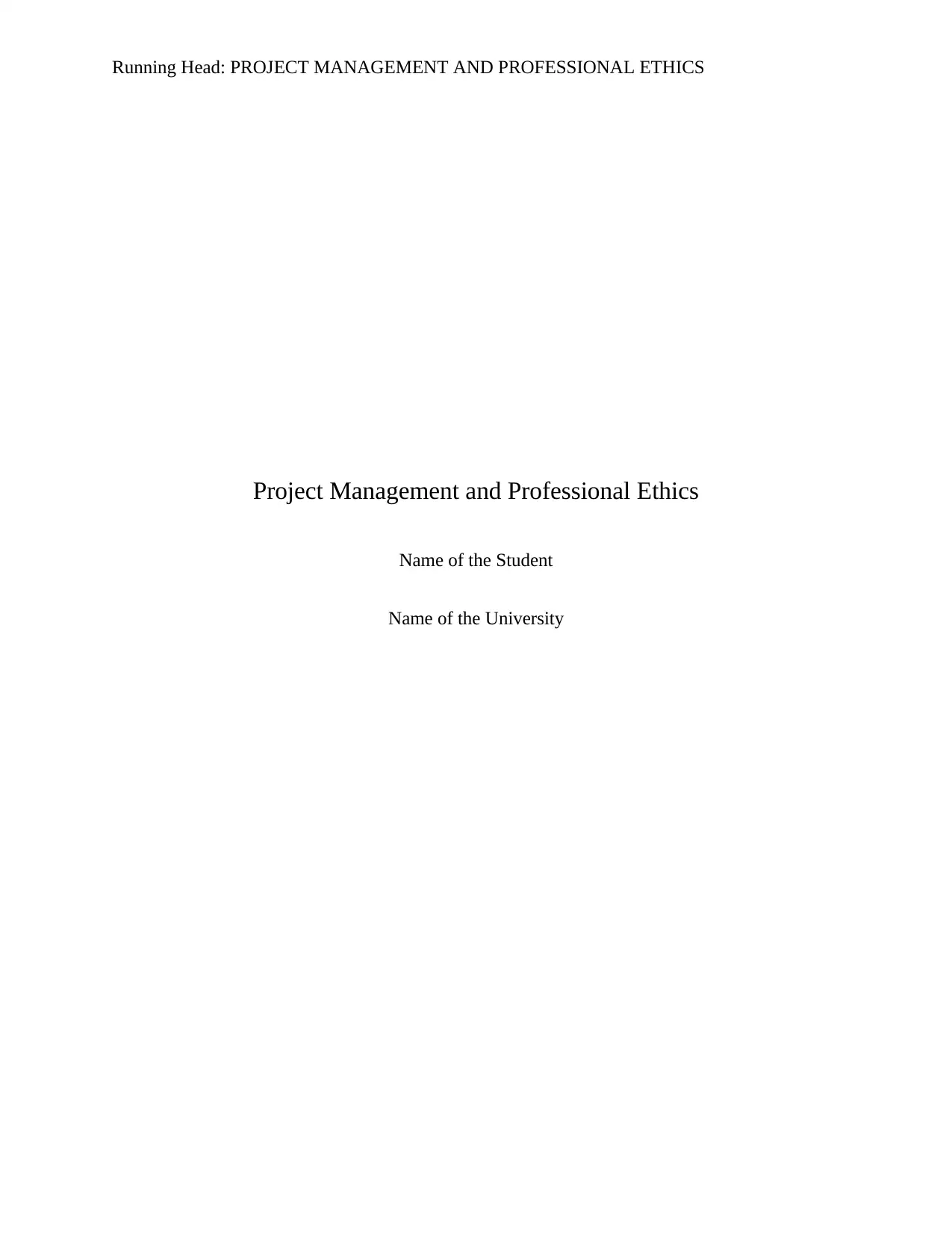
Running Head: PROJECT MANAGEMENT AND PROFESSIONAL ETHICS
Project Management and Professional Ethics
Name of the Student
Name of the University
Project Management and Professional Ethics
Name of the Student
Name of the University
Paraphrase This Document
Need a fresh take? Get an instant paraphrase of this document with our AI Paraphraser
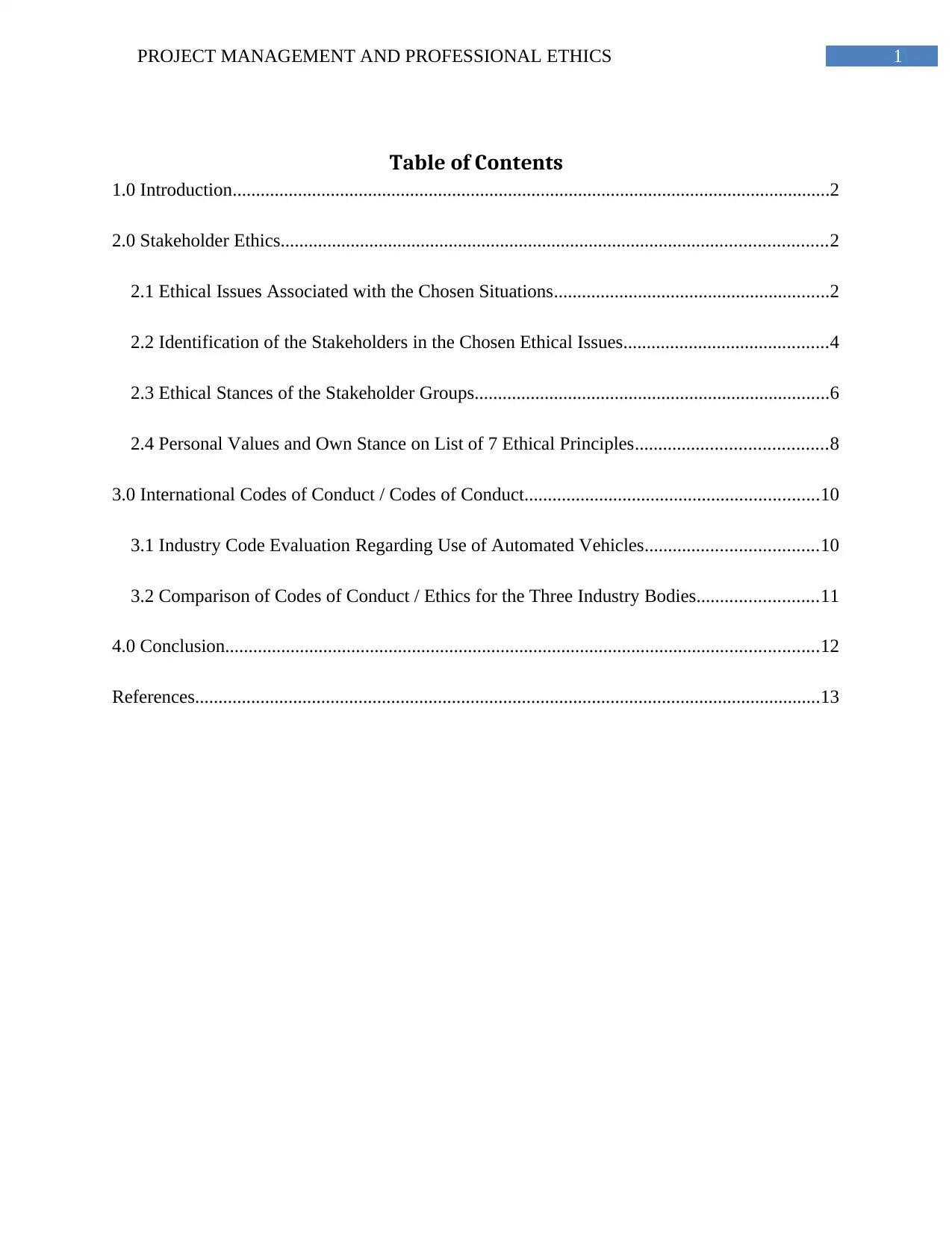
1PROJECT MANAGEMENT AND PROFESSIONAL ETHICS
Table of Contents
1.0 Introduction................................................................................................................................2
2.0 Stakeholder Ethics.....................................................................................................................2
2.1 Ethical Issues Associated with the Chosen Situations...........................................................2
2.2 Identification of the Stakeholders in the Chosen Ethical Issues............................................4
2.3 Ethical Stances of the Stakeholder Groups............................................................................6
2.4 Personal Values and Own Stance on List of 7 Ethical Principles.........................................8
3.0 International Codes of Conduct / Codes of Conduct...............................................................10
3.1 Industry Code Evaluation Regarding Use of Automated Vehicles.....................................10
3.2 Comparison of Codes of Conduct / Ethics for the Three Industry Bodies..........................11
4.0 Conclusion...............................................................................................................................12
References......................................................................................................................................13
Table of Contents
1.0 Introduction................................................................................................................................2
2.0 Stakeholder Ethics.....................................................................................................................2
2.1 Ethical Issues Associated with the Chosen Situations...........................................................2
2.2 Identification of the Stakeholders in the Chosen Ethical Issues............................................4
2.3 Ethical Stances of the Stakeholder Groups............................................................................6
2.4 Personal Values and Own Stance on List of 7 Ethical Principles.........................................8
3.0 International Codes of Conduct / Codes of Conduct...............................................................10
3.1 Industry Code Evaluation Regarding Use of Automated Vehicles.....................................10
3.2 Comparison of Codes of Conduct / Ethics for the Three Industry Bodies..........................11
4.0 Conclusion...............................................................................................................................12
References......................................................................................................................................13
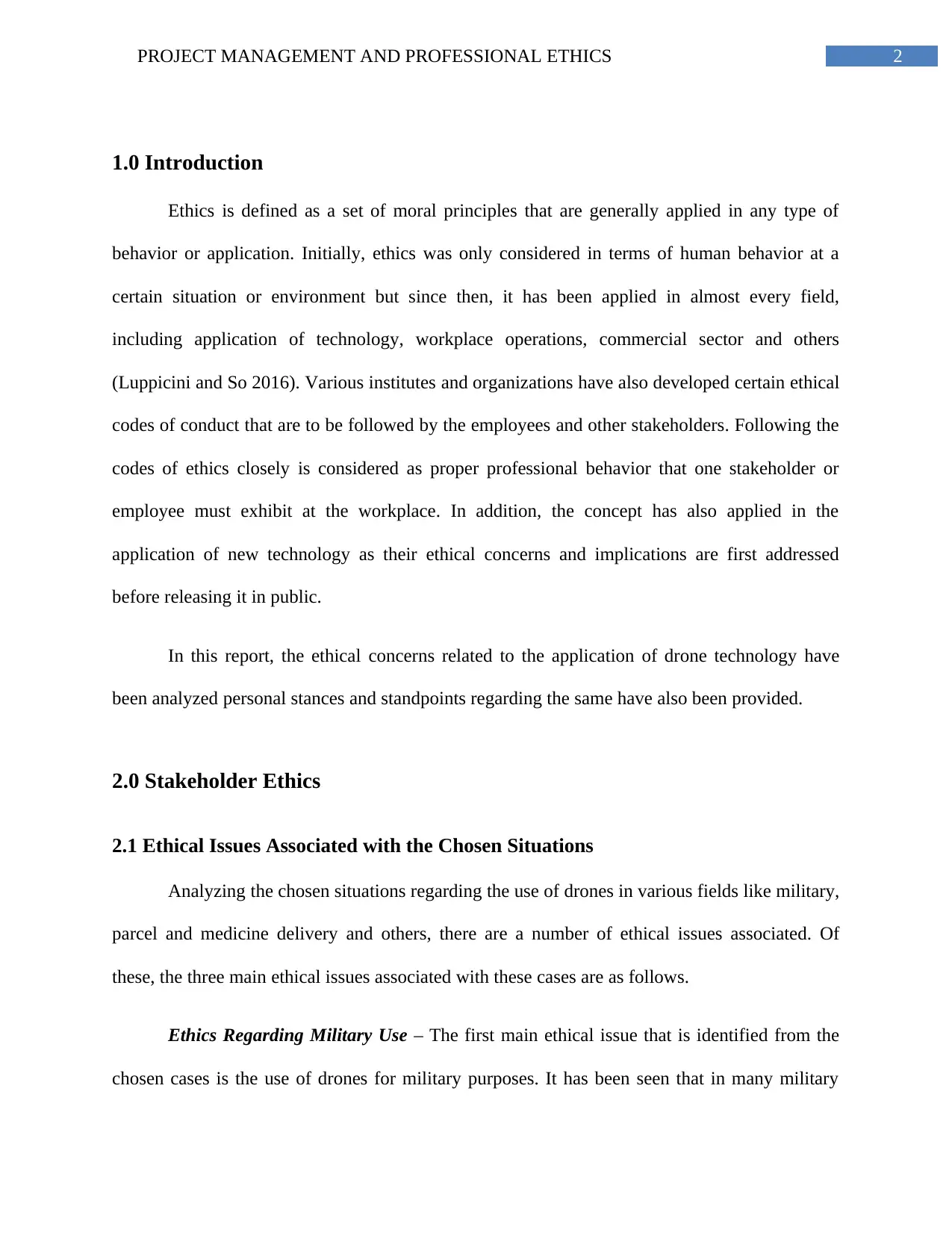
2PROJECT MANAGEMENT AND PROFESSIONAL ETHICS
1.0 Introduction
Ethics is defined as a set of moral principles that are generally applied in any type of
behavior or application. Initially, ethics was only considered in terms of human behavior at a
certain situation or environment but since then, it has been applied in almost every field,
including application of technology, workplace operations, commercial sector and others
(Luppicini and So 2016). Various institutes and organizations have also developed certain ethical
codes of conduct that are to be followed by the employees and other stakeholders. Following the
codes of ethics closely is considered as proper professional behavior that one stakeholder or
employee must exhibit at the workplace. In addition, the concept has also applied in the
application of new technology as their ethical concerns and implications are first addressed
before releasing it in public.
In this report, the ethical concerns related to the application of drone technology have
been analyzed personal stances and standpoints regarding the same have also been provided.
2.0 Stakeholder Ethics
2.1 Ethical Issues Associated with the Chosen Situations
Analyzing the chosen situations regarding the use of drones in various fields like military,
parcel and medicine delivery and others, there are a number of ethical issues associated. Of
these, the three main ethical issues associated with these cases are as follows.
Ethics Regarding Military Use – The first main ethical issue that is identified from the
chosen cases is the use of drones for military purposes. It has been seen that in many military
1.0 Introduction
Ethics is defined as a set of moral principles that are generally applied in any type of
behavior or application. Initially, ethics was only considered in terms of human behavior at a
certain situation or environment but since then, it has been applied in almost every field,
including application of technology, workplace operations, commercial sector and others
(Luppicini and So 2016). Various institutes and organizations have also developed certain ethical
codes of conduct that are to be followed by the employees and other stakeholders. Following the
codes of ethics closely is considered as proper professional behavior that one stakeholder or
employee must exhibit at the workplace. In addition, the concept has also applied in the
application of new technology as their ethical concerns and implications are first addressed
before releasing it in public.
In this report, the ethical concerns related to the application of drone technology have
been analyzed personal stances and standpoints regarding the same have also been provided.
2.0 Stakeholder Ethics
2.1 Ethical Issues Associated with the Chosen Situations
Analyzing the chosen situations regarding the use of drones in various fields like military,
parcel and medicine delivery and others, there are a number of ethical issues associated. Of
these, the three main ethical issues associated with these cases are as follows.
Ethics Regarding Military Use – The first main ethical issue that is identified from the
chosen cases is the use of drones for military purposes. It has been seen that in many military
⊘ This is a preview!⊘
Do you want full access?
Subscribe today to unlock all pages.

Trusted by 1+ million students worldwide
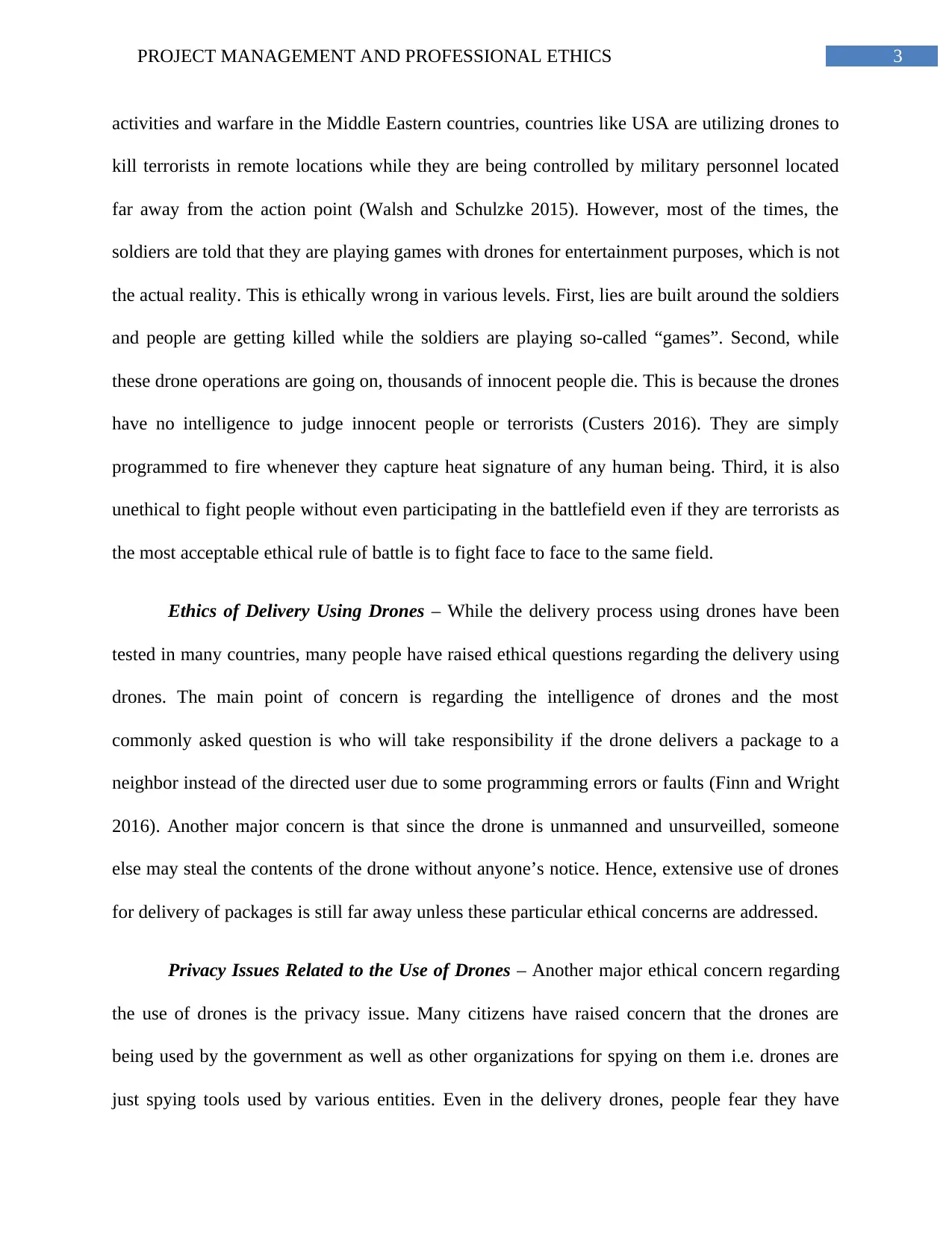
3PROJECT MANAGEMENT AND PROFESSIONAL ETHICS
activities and warfare in the Middle Eastern countries, countries like USA are utilizing drones to
kill terrorists in remote locations while they are being controlled by military personnel located
far away from the action point (Walsh and Schulzke 2015). However, most of the times, the
soldiers are told that they are playing games with drones for entertainment purposes, which is not
the actual reality. This is ethically wrong in various levels. First, lies are built around the soldiers
and people are getting killed while the soldiers are playing so-called “games”. Second, while
these drone operations are going on, thousands of innocent people die. This is because the drones
have no intelligence to judge innocent people or terrorists (Custers 2016). They are simply
programmed to fire whenever they capture heat signature of any human being. Third, it is also
unethical to fight people without even participating in the battlefield even if they are terrorists as
the most acceptable ethical rule of battle is to fight face to face to the same field.
Ethics of Delivery Using Drones – While the delivery process using drones have been
tested in many countries, many people have raised ethical questions regarding the delivery using
drones. The main point of concern is regarding the intelligence of drones and the most
commonly asked question is who will take responsibility if the drone delivers a package to a
neighbor instead of the directed user due to some programming errors or faults (Finn and Wright
2016). Another major concern is that since the drone is unmanned and unsurveilled, someone
else may steal the contents of the drone without anyone’s notice. Hence, extensive use of drones
for delivery of packages is still far away unless these particular ethical concerns are addressed.
Privacy Issues Related to the Use of Drones – Another major ethical concern regarding
the use of drones is the privacy issue. Many citizens have raised concern that the drones are
being used by the government as well as other organizations for spying on them i.e. drones are
just spying tools used by various entities. Even in the delivery drones, people fear they have
activities and warfare in the Middle Eastern countries, countries like USA are utilizing drones to
kill terrorists in remote locations while they are being controlled by military personnel located
far away from the action point (Walsh and Schulzke 2015). However, most of the times, the
soldiers are told that they are playing games with drones for entertainment purposes, which is not
the actual reality. This is ethically wrong in various levels. First, lies are built around the soldiers
and people are getting killed while the soldiers are playing so-called “games”. Second, while
these drone operations are going on, thousands of innocent people die. This is because the drones
have no intelligence to judge innocent people or terrorists (Custers 2016). They are simply
programmed to fire whenever they capture heat signature of any human being. Third, it is also
unethical to fight people without even participating in the battlefield even if they are terrorists as
the most acceptable ethical rule of battle is to fight face to face to the same field.
Ethics of Delivery Using Drones – While the delivery process using drones have been
tested in many countries, many people have raised ethical questions regarding the delivery using
drones. The main point of concern is regarding the intelligence of drones and the most
commonly asked question is who will take responsibility if the drone delivers a package to a
neighbor instead of the directed user due to some programming errors or faults (Finn and Wright
2016). Another major concern is that since the drone is unmanned and unsurveilled, someone
else may steal the contents of the drone without anyone’s notice. Hence, extensive use of drones
for delivery of packages is still far away unless these particular ethical concerns are addressed.
Privacy Issues Related to the Use of Drones – Another major ethical concern regarding
the use of drones is the privacy issue. Many citizens have raised concern that the drones are
being used by the government as well as other organizations for spying on them i.e. drones are
just spying tools used by various entities. Even in the delivery drones, people fear they have
Paraphrase This Document
Need a fresh take? Get an instant paraphrase of this document with our AI Paraphraser
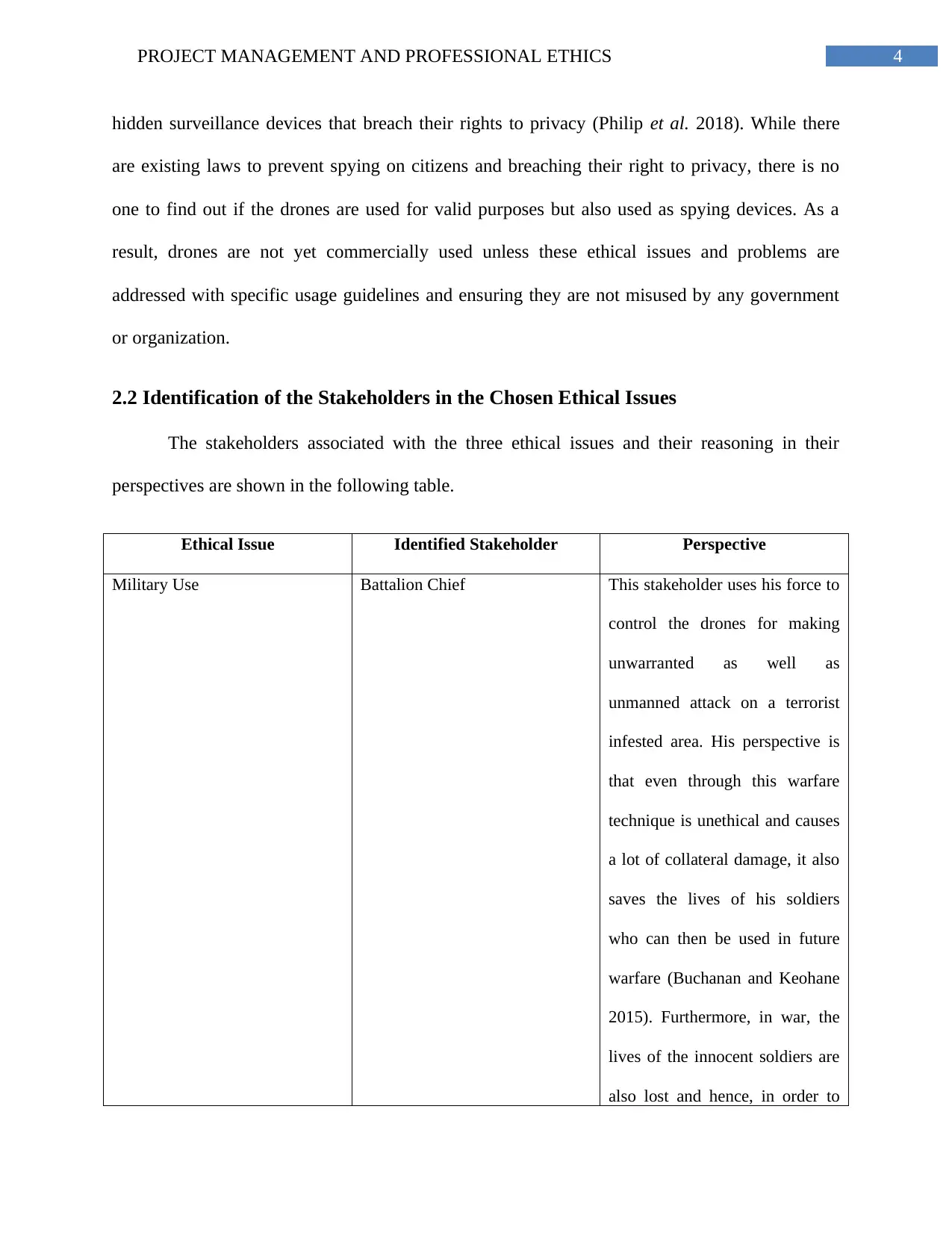
4PROJECT MANAGEMENT AND PROFESSIONAL ETHICS
hidden surveillance devices that breach their rights to privacy (Philip et al. 2018). While there
are existing laws to prevent spying on citizens and breaching their right to privacy, there is no
one to find out if the drones are used for valid purposes but also used as spying devices. As a
result, drones are not yet commercially used unless these ethical issues and problems are
addressed with specific usage guidelines and ensuring they are not misused by any government
or organization.
2.2 Identification of the Stakeholders in the Chosen Ethical Issues
The stakeholders associated with the three ethical issues and their reasoning in their
perspectives are shown in the following table.
Ethical Issue Identified Stakeholder Perspective
Military Use Battalion Chief This stakeholder uses his force to
control the drones for making
unwarranted as well as
unmanned attack on a terrorist
infested area. His perspective is
that even through this warfare
technique is unethical and causes
a lot of collateral damage, it also
saves the lives of his soldiers
who can then be used in future
warfare (Buchanan and Keohane
2015). Furthermore, in war, the
lives of the innocent soldiers are
also lost and hence, in order to
hidden surveillance devices that breach their rights to privacy (Philip et al. 2018). While there
are existing laws to prevent spying on citizens and breaching their right to privacy, there is no
one to find out if the drones are used for valid purposes but also used as spying devices. As a
result, drones are not yet commercially used unless these ethical issues and problems are
addressed with specific usage guidelines and ensuring they are not misused by any government
or organization.
2.2 Identification of the Stakeholders in the Chosen Ethical Issues
The stakeholders associated with the three ethical issues and their reasoning in their
perspectives are shown in the following table.
Ethical Issue Identified Stakeholder Perspective
Military Use Battalion Chief This stakeholder uses his force to
control the drones for making
unwarranted as well as
unmanned attack on a terrorist
infested area. His perspective is
that even through this warfare
technique is unethical and causes
a lot of collateral damage, it also
saves the lives of his soldiers
who can then be used in future
warfare (Buchanan and Keohane
2015). Furthermore, in war, the
lives of the innocent soldiers are
also lost and hence, in order to
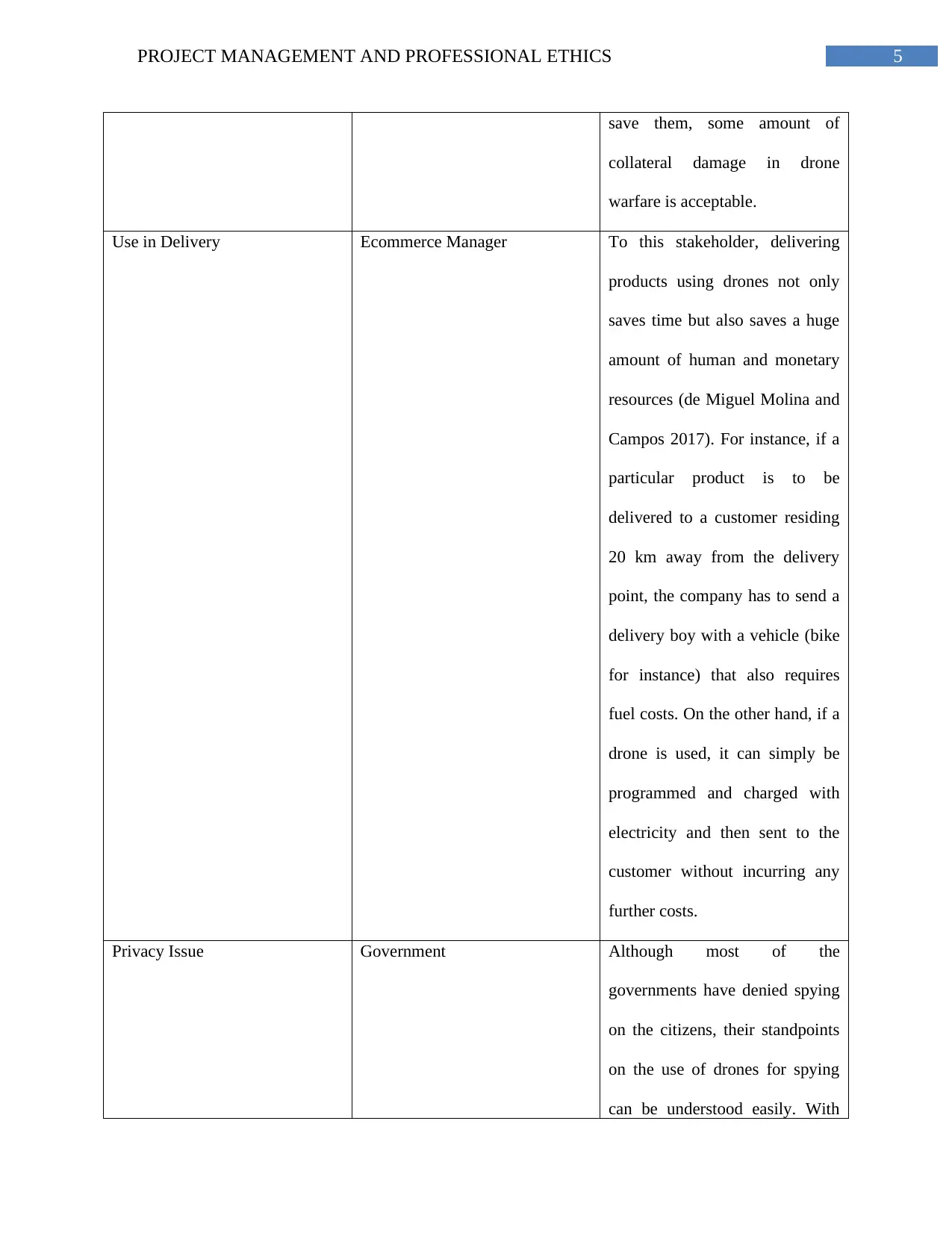
5PROJECT MANAGEMENT AND PROFESSIONAL ETHICS
save them, some amount of
collateral damage in drone
warfare is acceptable.
Use in Delivery Ecommerce Manager To this stakeholder, delivering
products using drones not only
saves time but also saves a huge
amount of human and monetary
resources (de Miguel Molina and
Campos 2017). For instance, if a
particular product is to be
delivered to a customer residing
20 km away from the delivery
point, the company has to send a
delivery boy with a vehicle (bike
for instance) that also requires
fuel costs. On the other hand, if a
drone is used, it can simply be
programmed and charged with
electricity and then sent to the
customer without incurring any
further costs.
Privacy Issue Government Although most of the
governments have denied spying
on the citizens, their standpoints
on the use of drones for spying
can be understood easily. With
save them, some amount of
collateral damage in drone
warfare is acceptable.
Use in Delivery Ecommerce Manager To this stakeholder, delivering
products using drones not only
saves time but also saves a huge
amount of human and monetary
resources (de Miguel Molina and
Campos 2017). For instance, if a
particular product is to be
delivered to a customer residing
20 km away from the delivery
point, the company has to send a
delivery boy with a vehicle (bike
for instance) that also requires
fuel costs. On the other hand, if a
drone is used, it can simply be
programmed and charged with
electricity and then sent to the
customer without incurring any
further costs.
Privacy Issue Government Although most of the
governments have denied spying
on the citizens, their standpoints
on the use of drones for spying
can be understood easily. With
⊘ This is a preview!⊘
Do you want full access?
Subscribe today to unlock all pages.

Trusted by 1+ million students worldwide
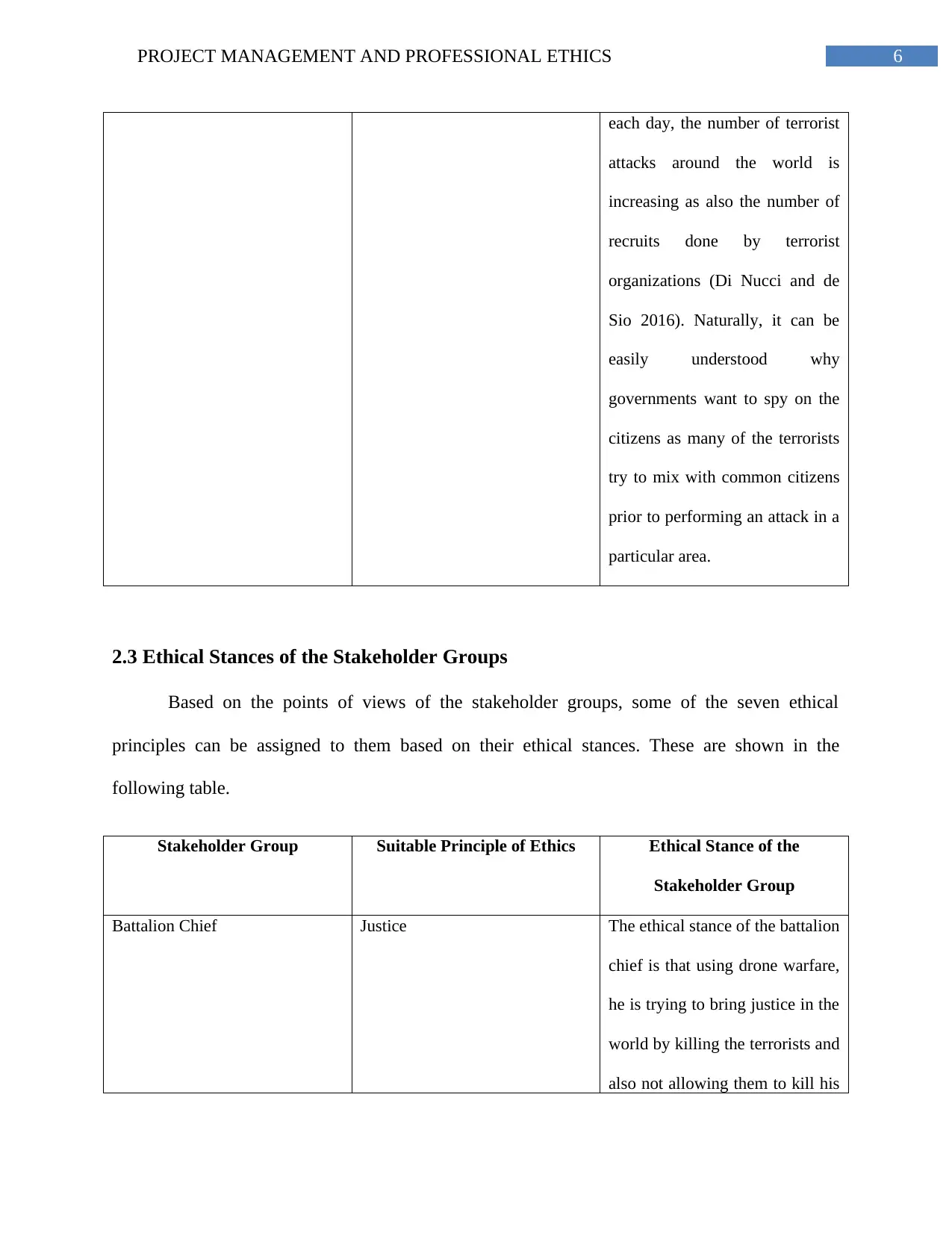
6PROJECT MANAGEMENT AND PROFESSIONAL ETHICS
each day, the number of terrorist
attacks around the world is
increasing as also the number of
recruits done by terrorist
organizations (Di Nucci and de
Sio 2016). Naturally, it can be
easily understood why
governments want to spy on the
citizens as many of the terrorists
try to mix with common citizens
prior to performing an attack in a
particular area.
2.3 Ethical Stances of the Stakeholder Groups
Based on the points of views of the stakeholder groups, some of the seven ethical
principles can be assigned to them based on their ethical stances. These are shown in the
following table.
Stakeholder Group Suitable Principle of Ethics Ethical Stance of the
Stakeholder Group
Battalion Chief Justice The ethical stance of the battalion
chief is that using drone warfare,
he is trying to bring justice in the
world by killing the terrorists and
also not allowing them to kill his
each day, the number of terrorist
attacks around the world is
increasing as also the number of
recruits done by terrorist
organizations (Di Nucci and de
Sio 2016). Naturally, it can be
easily understood why
governments want to spy on the
citizens as many of the terrorists
try to mix with common citizens
prior to performing an attack in a
particular area.
2.3 Ethical Stances of the Stakeholder Groups
Based on the points of views of the stakeholder groups, some of the seven ethical
principles can be assigned to them based on their ethical stances. These are shown in the
following table.
Stakeholder Group Suitable Principle of Ethics Ethical Stance of the
Stakeholder Group
Battalion Chief Justice The ethical stance of the battalion
chief is that using drone warfare,
he is trying to bring justice in the
world by killing the terrorists and
also not allowing them to kill his
Paraphrase This Document
Need a fresh take? Get an instant paraphrase of this document with our AI Paraphraser
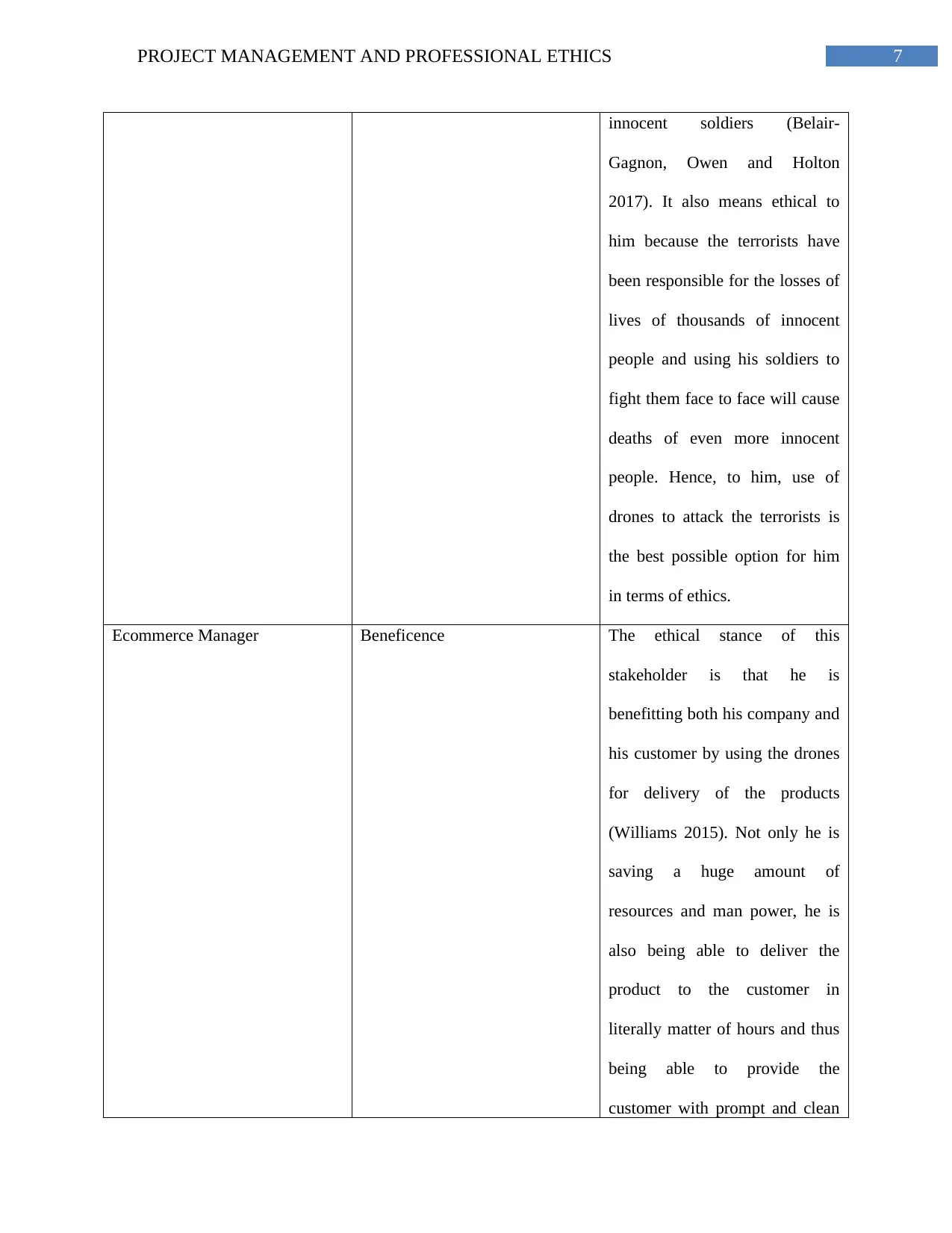
7PROJECT MANAGEMENT AND PROFESSIONAL ETHICS
innocent soldiers (Belair-
Gagnon, Owen and Holton
2017). It also means ethical to
him because the terrorists have
been responsible for the losses of
lives of thousands of innocent
people and using his soldiers to
fight them face to face will cause
deaths of even more innocent
people. Hence, to him, use of
drones to attack the terrorists is
the best possible option for him
in terms of ethics.
Ecommerce Manager Beneficence The ethical stance of this
stakeholder is that he is
benefitting both his company and
his customer by using the drones
for delivery of the products
(Williams 2015). Not only he is
saving a huge amount of
resources and man power, he is
also being able to deliver the
product to the customer in
literally matter of hours and thus
being able to provide the
customer with prompt and clean
innocent soldiers (Belair-
Gagnon, Owen and Holton
2017). It also means ethical to
him because the terrorists have
been responsible for the losses of
lives of thousands of innocent
people and using his soldiers to
fight them face to face will cause
deaths of even more innocent
people. Hence, to him, use of
drones to attack the terrorists is
the best possible option for him
in terms of ethics.
Ecommerce Manager Beneficence The ethical stance of this
stakeholder is that he is
benefitting both his company and
his customer by using the drones
for delivery of the products
(Williams 2015). Not only he is
saving a huge amount of
resources and man power, he is
also being able to deliver the
product to the customer in
literally matter of hours and thus
being able to provide the
customer with prompt and clean
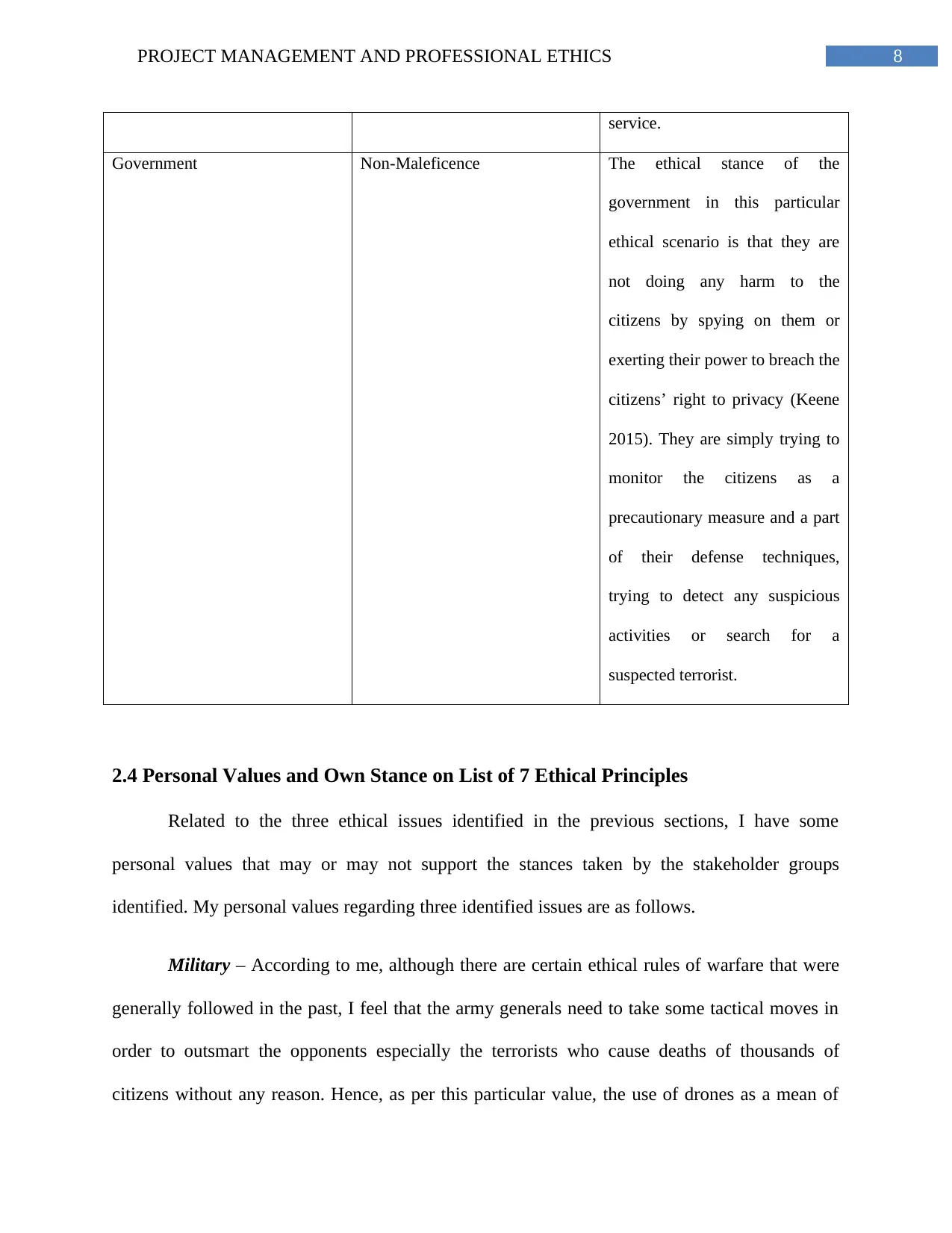
8PROJECT MANAGEMENT AND PROFESSIONAL ETHICS
service.
Government Non-Maleficence The ethical stance of the
government in this particular
ethical scenario is that they are
not doing any harm to the
citizens by spying on them or
exerting their power to breach the
citizens’ right to privacy (Keene
2015). They are simply trying to
monitor the citizens as a
precautionary measure and a part
of their defense techniques,
trying to detect any suspicious
activities or search for a
suspected terrorist.
2.4 Personal Values and Own Stance on List of 7 Ethical Principles
Related to the three ethical issues identified in the previous sections, I have some
personal values that may or may not support the stances taken by the stakeholder groups
identified. My personal values regarding three identified issues are as follows.
Military – According to me, although there are certain ethical rules of warfare that were
generally followed in the past, I feel that the army generals need to take some tactical moves in
order to outsmart the opponents especially the terrorists who cause deaths of thousands of
citizens without any reason. Hence, as per this particular value, the use of drones as a mean of
service.
Government Non-Maleficence The ethical stance of the
government in this particular
ethical scenario is that they are
not doing any harm to the
citizens by spying on them or
exerting their power to breach the
citizens’ right to privacy (Keene
2015). They are simply trying to
monitor the citizens as a
precautionary measure and a part
of their defense techniques,
trying to detect any suspicious
activities or search for a
suspected terrorist.
2.4 Personal Values and Own Stance on List of 7 Ethical Principles
Related to the three ethical issues identified in the previous sections, I have some
personal values that may or may not support the stances taken by the stakeholder groups
identified. My personal values regarding three identified issues are as follows.
Military – According to me, although there are certain ethical rules of warfare that were
generally followed in the past, I feel that the army generals need to take some tactical moves in
order to outsmart the opponents especially the terrorists who cause deaths of thousands of
citizens without any reason. Hence, as per this particular value, the use of drones as a mean of
⊘ This is a preview!⊘
Do you want full access?
Subscribe today to unlock all pages.

Trusted by 1+ million students worldwide
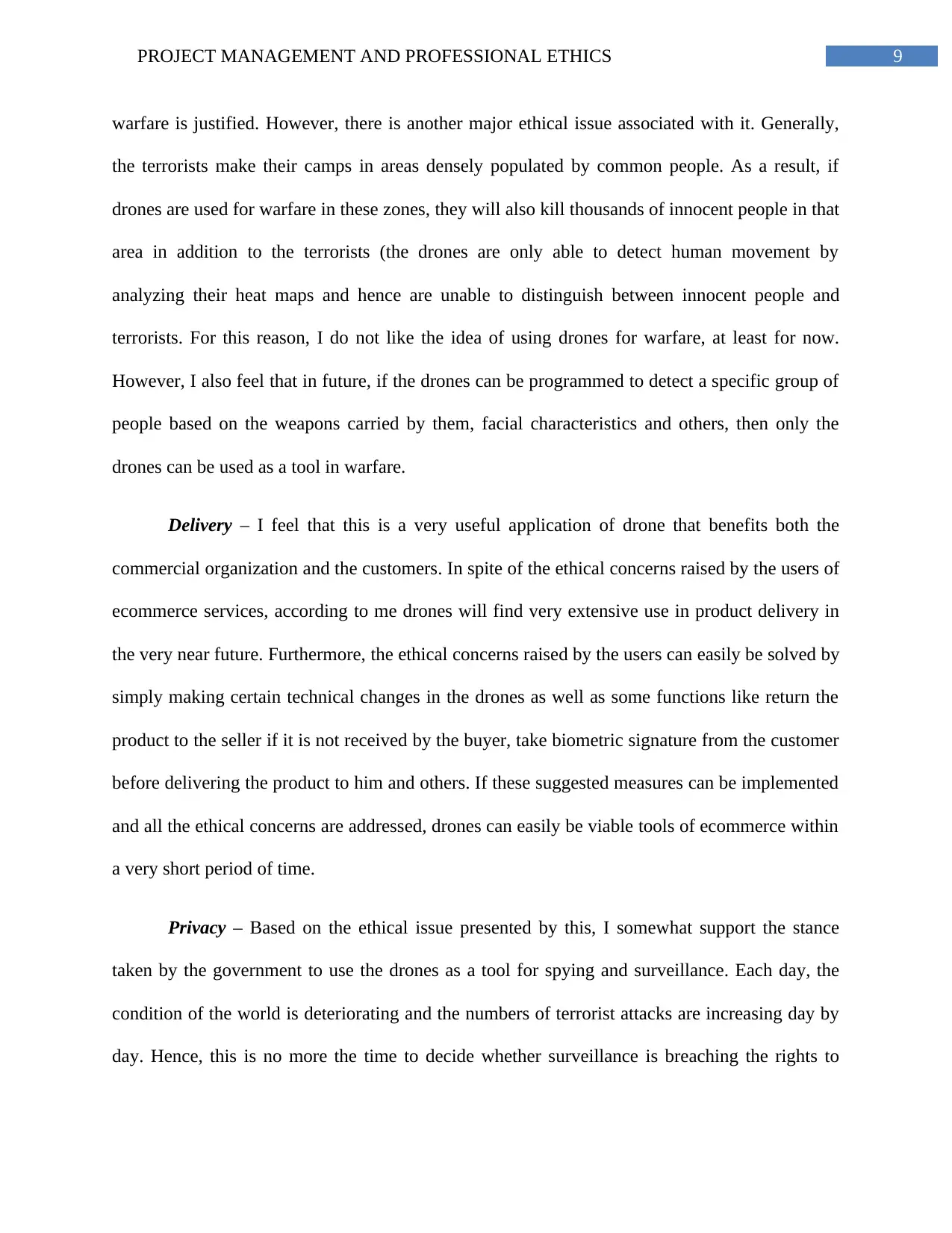
9PROJECT MANAGEMENT AND PROFESSIONAL ETHICS
warfare is justified. However, there is another major ethical issue associated with it. Generally,
the terrorists make their camps in areas densely populated by common people. As a result, if
drones are used for warfare in these zones, they will also kill thousands of innocent people in that
area in addition to the terrorists (the drones are only able to detect human movement by
analyzing their heat maps and hence are unable to distinguish between innocent people and
terrorists. For this reason, I do not like the idea of using drones for warfare, at least for now.
However, I also feel that in future, if the drones can be programmed to detect a specific group of
people based on the weapons carried by them, facial characteristics and others, then only the
drones can be used as a tool in warfare.
Delivery – I feel that this is a very useful application of drone that benefits both the
commercial organization and the customers. In spite of the ethical concerns raised by the users of
ecommerce services, according to me drones will find very extensive use in product delivery in
the very near future. Furthermore, the ethical concerns raised by the users can easily be solved by
simply making certain technical changes in the drones as well as some functions like return the
product to the seller if it is not received by the buyer, take biometric signature from the customer
before delivering the product to him and others. If these suggested measures can be implemented
and all the ethical concerns are addressed, drones can easily be viable tools of ecommerce within
a very short period of time.
Privacy – Based on the ethical issue presented by this, I somewhat support the stance
taken by the government to use the drones as a tool for spying and surveillance. Each day, the
condition of the world is deteriorating and the numbers of terrorist attacks are increasing day by
day. Hence, this is no more the time to decide whether surveillance is breaching the rights to
warfare is justified. However, there is another major ethical issue associated with it. Generally,
the terrorists make their camps in areas densely populated by common people. As a result, if
drones are used for warfare in these zones, they will also kill thousands of innocent people in that
area in addition to the terrorists (the drones are only able to detect human movement by
analyzing their heat maps and hence are unable to distinguish between innocent people and
terrorists. For this reason, I do not like the idea of using drones for warfare, at least for now.
However, I also feel that in future, if the drones can be programmed to detect a specific group of
people based on the weapons carried by them, facial characteristics and others, then only the
drones can be used as a tool in warfare.
Delivery – I feel that this is a very useful application of drone that benefits both the
commercial organization and the customers. In spite of the ethical concerns raised by the users of
ecommerce services, according to me drones will find very extensive use in product delivery in
the very near future. Furthermore, the ethical concerns raised by the users can easily be solved by
simply making certain technical changes in the drones as well as some functions like return the
product to the seller if it is not received by the buyer, take biometric signature from the customer
before delivering the product to him and others. If these suggested measures can be implemented
and all the ethical concerns are addressed, drones can easily be viable tools of ecommerce within
a very short period of time.
Privacy – Based on the ethical issue presented by this, I somewhat support the stance
taken by the government to use the drones as a tool for spying and surveillance. Each day, the
condition of the world is deteriorating and the numbers of terrorist attacks are increasing day by
day. Hence, this is no more the time to decide whether surveillance is breaching the rights to
Paraphrase This Document
Need a fresh take? Get an instant paraphrase of this document with our AI Paraphraser
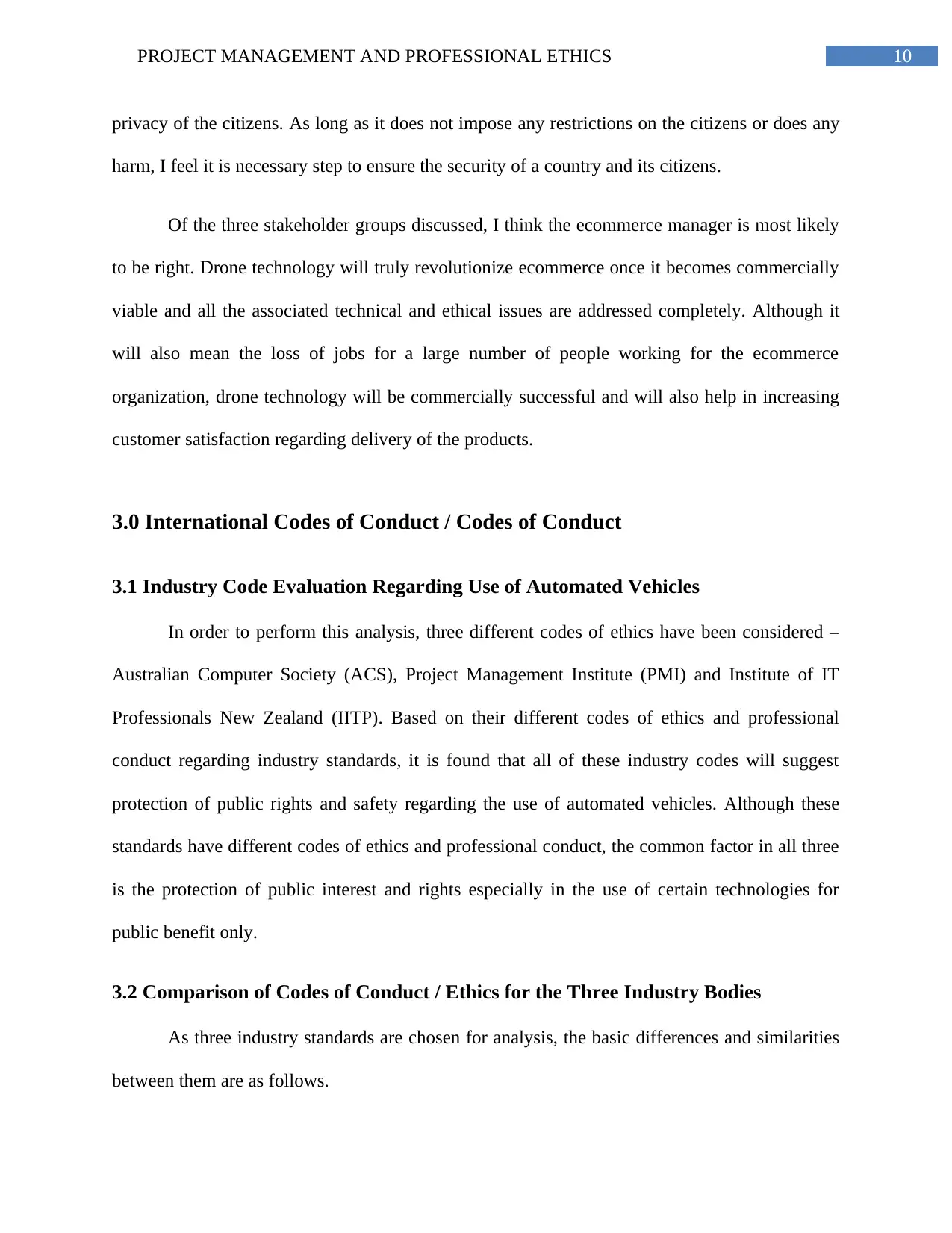
10PROJECT MANAGEMENT AND PROFESSIONAL ETHICS
privacy of the citizens. As long as it does not impose any restrictions on the citizens or does any
harm, I feel it is necessary step to ensure the security of a country and its citizens.
Of the three stakeholder groups discussed, I think the ecommerce manager is most likely
to be right. Drone technology will truly revolutionize ecommerce once it becomes commercially
viable and all the associated technical and ethical issues are addressed completely. Although it
will also mean the loss of jobs for a large number of people working for the ecommerce
organization, drone technology will be commercially successful and will also help in increasing
customer satisfaction regarding delivery of the products.
3.0 International Codes of Conduct / Codes of Conduct
3.1 Industry Code Evaluation Regarding Use of Automated Vehicles
In order to perform this analysis, three different codes of ethics have been considered –
Australian Computer Society (ACS), Project Management Institute (PMI) and Institute of IT
Professionals New Zealand (IITP). Based on their different codes of ethics and professional
conduct regarding industry standards, it is found that all of these industry codes will suggest
protection of public rights and safety regarding the use of automated vehicles. Although these
standards have different codes of ethics and professional conduct, the common factor in all three
is the protection of public interest and rights especially in the use of certain technologies for
public benefit only.
3.2 Comparison of Codes of Conduct / Ethics for the Three Industry Bodies
As three industry standards are chosen for analysis, the basic differences and similarities
between them are as follows.
privacy of the citizens. As long as it does not impose any restrictions on the citizens or does any
harm, I feel it is necessary step to ensure the security of a country and its citizens.
Of the three stakeholder groups discussed, I think the ecommerce manager is most likely
to be right. Drone technology will truly revolutionize ecommerce once it becomes commercially
viable and all the associated technical and ethical issues are addressed completely. Although it
will also mean the loss of jobs for a large number of people working for the ecommerce
organization, drone technology will be commercially successful and will also help in increasing
customer satisfaction regarding delivery of the products.
3.0 International Codes of Conduct / Codes of Conduct
3.1 Industry Code Evaluation Regarding Use of Automated Vehicles
In order to perform this analysis, three different codes of ethics have been considered –
Australian Computer Society (ACS), Project Management Institute (PMI) and Institute of IT
Professionals New Zealand (IITP). Based on their different codes of ethics and professional
conduct regarding industry standards, it is found that all of these industry codes will suggest
protection of public rights and safety regarding the use of automated vehicles. Although these
standards have different codes of ethics and professional conduct, the common factor in all three
is the protection of public interest and rights especially in the use of certain technologies for
public benefit only.
3.2 Comparison of Codes of Conduct / Ethics for the Three Industry Bodies
As three industry standards are chosen for analysis, the basic differences and similarities
between them are as follows.
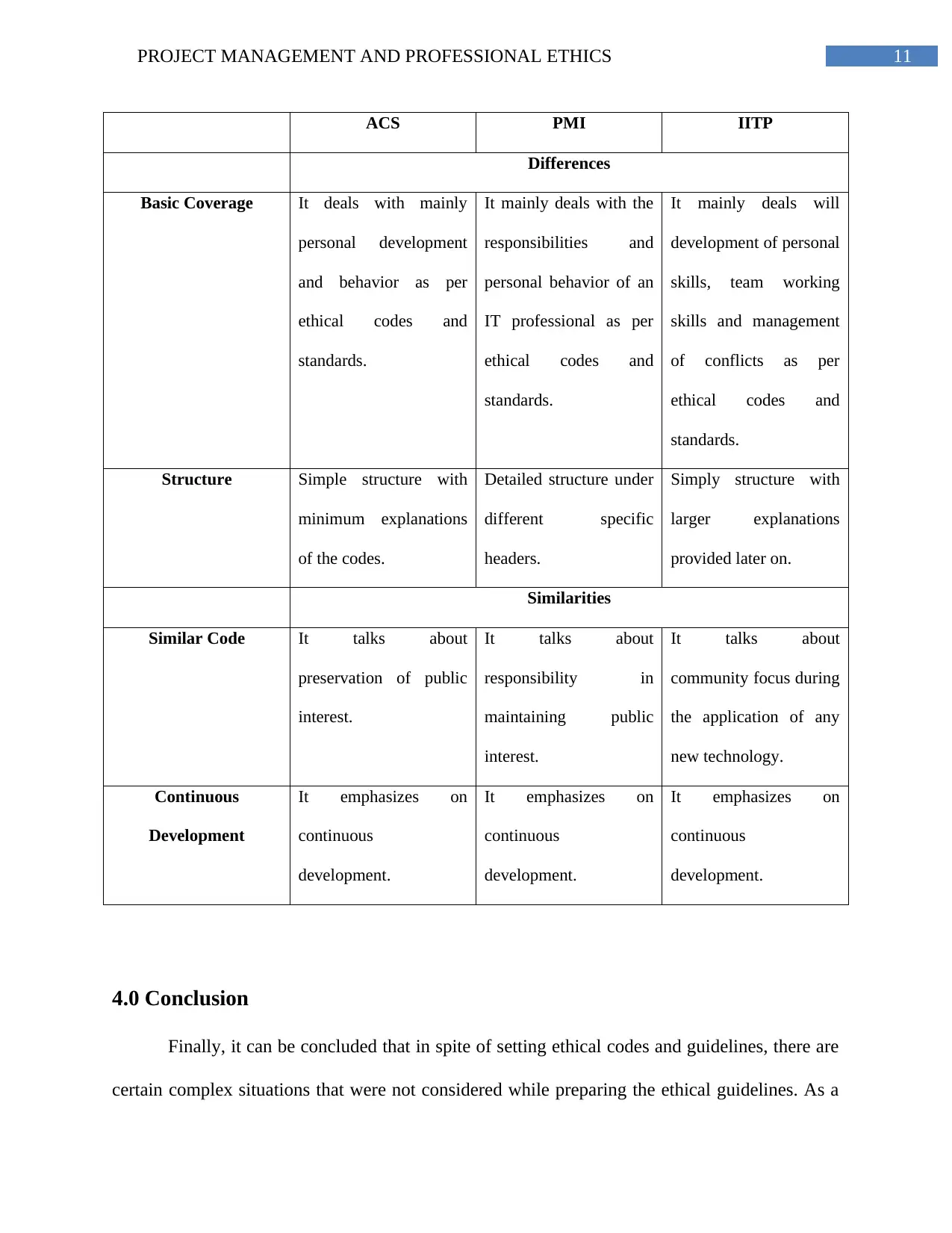
11PROJECT MANAGEMENT AND PROFESSIONAL ETHICS
ACS PMI IITP
Differences
Basic Coverage It deals with mainly
personal development
and behavior as per
ethical codes and
standards.
It mainly deals with the
responsibilities and
personal behavior of an
IT professional as per
ethical codes and
standards.
It mainly deals will
development of personal
skills, team working
skills and management
of conflicts as per
ethical codes and
standards.
Structure Simple structure with
minimum explanations
of the codes.
Detailed structure under
different specific
headers.
Simply structure with
larger explanations
provided later on.
Similarities
Similar Code It talks about
preservation of public
interest.
It talks about
responsibility in
maintaining public
interest.
It talks about
community focus during
the application of any
new technology.
Continuous
Development
It emphasizes on
continuous
development.
It emphasizes on
continuous
development.
It emphasizes on
continuous
development.
4.0 Conclusion
Finally, it can be concluded that in spite of setting ethical codes and guidelines, there are
certain complex situations that were not considered while preparing the ethical guidelines. As a
ACS PMI IITP
Differences
Basic Coverage It deals with mainly
personal development
and behavior as per
ethical codes and
standards.
It mainly deals with the
responsibilities and
personal behavior of an
IT professional as per
ethical codes and
standards.
It mainly deals will
development of personal
skills, team working
skills and management
of conflicts as per
ethical codes and
standards.
Structure Simple structure with
minimum explanations
of the codes.
Detailed structure under
different specific
headers.
Simply structure with
larger explanations
provided later on.
Similarities
Similar Code It talks about
preservation of public
interest.
It talks about
responsibility in
maintaining public
interest.
It talks about
community focus during
the application of any
new technology.
Continuous
Development
It emphasizes on
continuous
development.
It emphasizes on
continuous
development.
It emphasizes on
continuous
development.
4.0 Conclusion
Finally, it can be concluded that in spite of setting ethical codes and guidelines, there are
certain complex situations that were not considered while preparing the ethical guidelines. As a
⊘ This is a preview!⊘
Do you want full access?
Subscribe today to unlock all pages.

Trusted by 1+ million students worldwide
1 out of 14
Your All-in-One AI-Powered Toolkit for Academic Success.
+13062052269
info@desklib.com
Available 24*7 on WhatsApp / Email
![[object Object]](/_next/static/media/star-bottom.7253800d.svg)
Unlock your academic potential
Copyright © 2020–2026 A2Z Services. All Rights Reserved. Developed and managed by ZUCOL.

